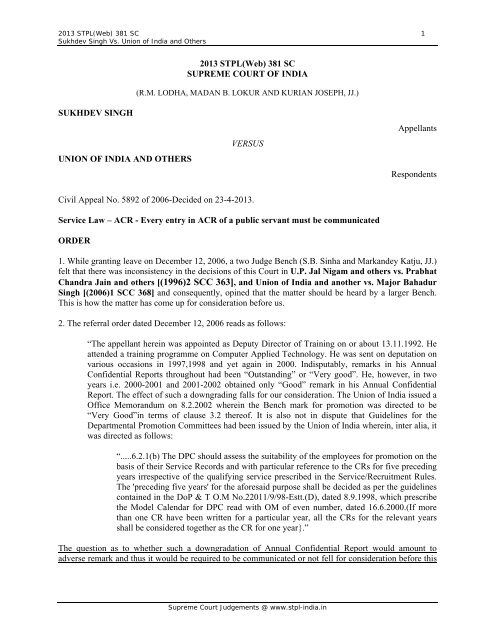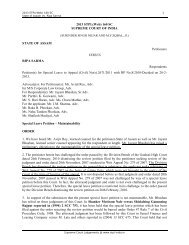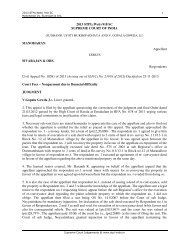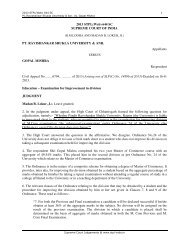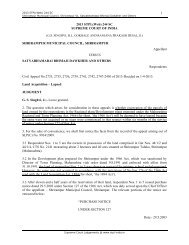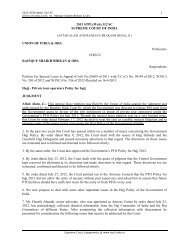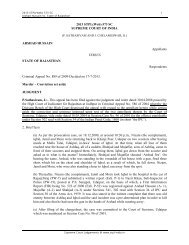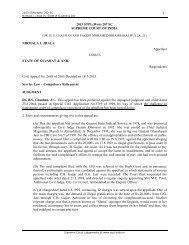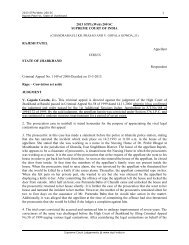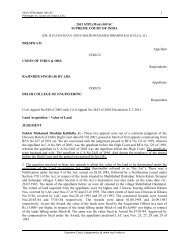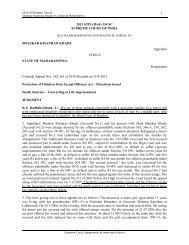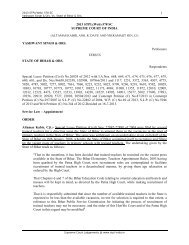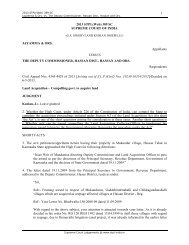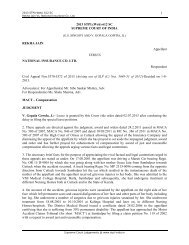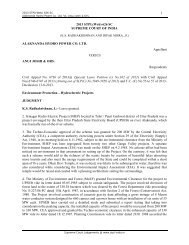2013 STPL(Web) 381 SC-FB-Sukhdev Singh Vs. Union of India and ...
2013 STPL(Web) 381 SC-FB-Sukhdev Singh Vs. Union of India and ...
2013 STPL(Web) 381 SC-FB-Sukhdev Singh Vs. Union of India and ...
You also want an ePaper? Increase the reach of your titles
YUMPU automatically turns print PDFs into web optimized ePapers that Google loves.
<strong>2013</strong> <strong>STPL</strong>(<strong>Web</strong>) <strong>381</strong> <strong>SC</strong> 1<strong>Sukhdev</strong> <strong>Singh</strong> <strong>Vs</strong>. <strong>Union</strong> <strong>of</strong> <strong>India</strong> <strong>and</strong> Others<strong>2013</strong> <strong>STPL</strong>(<strong>Web</strong>) <strong>381</strong> <strong>SC</strong>SUPREME COURT OF INDIA(R.M. LODHA, MADAN B. LOKUR AND KURIAN JOSEPH, JJ.)SUKHDEV SINGHUNION OF INDIA AND OTHERSVERSUSAppellantsRespondentsCivil Appeal No. 5892 <strong>of</strong> 2006-Decided on 23-4-<strong>2013</strong>.Service Law – ACR - Every entry in ACR <strong>of</strong> a public servant must be communicatedORDER1. While granting leave on December 12, 2006, a two Judge Bench (S.B. Sinha <strong>and</strong> Mark<strong>and</strong>ey Katju, JJ.)felt that there was inconsistency in the decisions <strong>of</strong> this Court in U.P. Jal Nigam <strong>and</strong> others vs. PrabhatCh<strong>and</strong>ra Jain <strong>and</strong> others [(1996)2 <strong>SC</strong>C 363], <strong>and</strong> <strong>Union</strong> <strong>of</strong> <strong>India</strong> <strong>and</strong> another vs. Major Bahadur<strong>Singh</strong> [(2006)1 <strong>SC</strong>C 368] <strong>and</strong> consequently, opined that the matter should be heard by a larger Bench.This is how the matter has come up for consideration before us.2. The referral order dated December 12, 2006 reads as follows:“The appellant herein was appointed as Deputy Director <strong>of</strong> Training on or about 13.11.1992. Heattended a training programme on Computer Applied Technology. He was sent on deputation onvarious occasions in 1997,1998 <strong>and</strong> yet again in 2000. Indisputably, remarks in his AnnualConfidential Reports throughout had been “Outst<strong>and</strong>ing” or “Very good”. He, however, in twoyears i.e. 2000-2001 <strong>and</strong> 2001-2002 obtained only “Good” remark in his Annual ConfidentialReport. The effect <strong>of</strong> such a downgrading falls for our consideration. The <strong>Union</strong> <strong>of</strong> <strong>India</strong> issued aOffice Memor<strong>and</strong>um on 8.2.2002 wherein the Bench mark for promotion was directed to be“Very Good”in terms <strong>of</strong> clause 3.2 there<strong>of</strong>. It is also not in dispute that Guidelines for theDepartmental Promotion Committees had been issued by the <strong>Union</strong> <strong>of</strong> <strong>India</strong> wherein, inter alia, itwas directed as follows:“.....6.2.1(b) The DPC should assess the suitability <strong>of</strong> the employees for promotion on thebasis <strong>of</strong> their Service Records <strong>and</strong> with particular reference to the CRs for five precedingyears irrespective <strong>of</strong> the qualifying service prescribed in the Service/Recruitment Rules.The 'preceding five years' for the aforesaid purpose shall be decided as per the guidelinescontained in the DoP & T O.M No.22011/9/98-Estt.(D), dated 8.9.1998, which prescribethe Model Calendar for DPC read with OM <strong>of</strong> even number, dated 16.6.2000.(If morethan one CR have been written for a particular year, all the CRs for the relevant yearsshall be considered together as the CR for one year}.”The question as to whether such a downgradation <strong>of</strong> Annual Confidential Report would amount toadverse remark <strong>and</strong> thus it would be required to be communicated or not fell for consideration before thisSupreme Court Judgements @ www.stpl-india.in
<strong>2013</strong> <strong>STPL</strong>(<strong>Web</strong>) <strong>381</strong> <strong>SC</strong> 3<strong>Sukhdev</strong> <strong>Singh</strong> <strong>Vs</strong>. <strong>Union</strong> <strong>of</strong> <strong>India</strong> <strong>and</strong> Others<strong>India</strong> [(1978)1 <strong>SC</strong>C 248]; <strong>Union</strong> <strong>of</strong> <strong>India</strong> vs. Tulsi Ram Patel [(1985)3 <strong>SC</strong>C 398]; Canara Bank vs.V.K. Awasthy [(2005)6 <strong>SC</strong>C 321] <strong>and</strong> State <strong>of</strong> Maharashtra vs. Public Concern for GovernanceTrust[(2007)3 <strong>SC</strong>C 587] concluded that every entry in the ACR <strong>of</strong> a public service must becommunicated to him within a reasonable period whether it is poor, fair, average, good or very goodentry. This is what this Court in paragraphs 17 & 18 <strong>of</strong> the report in Dev Dutt [(2008)8 <strong>SC</strong>C 725] at page733:“In our opinion, every entry in the A.C.R. <strong>of</strong> a public servant must be communicated to himwithin a reasonable period, whether it is a poor, fair, average, good or very good entry. This isbecause non-communication <strong>of</strong> such an entry may adversely affect the employee in two ways :(1) Had the entry been communicated to him he would know about the assessment <strong>of</strong> his work<strong>and</strong> conduct by his superiors, which would enable him to improve his work in future (2) Hewould have an opportunity <strong>of</strong> making a representation against the entry if he feels it is unjustified,<strong>and</strong> pray for its upgradation. Hence non-communication <strong>of</strong> an entry is arbitrary, <strong>and</strong> it has beenheld by the Constitution Bench decision <strong>of</strong> this Court in Maneka G<strong>and</strong>hi vs. <strong>Union</strong> <strong>of</strong> <strong>India</strong>(supra) that arbitrariness violates Article 14 <strong>of</strong> the Constitution.Thus it is not only when there is a benchmark but in all cases that an entry (whether it is poor,fair, average, good or very good) must be communicated to a public servant, otherwise there isviolation <strong>of</strong> the principle <strong>of</strong> fairness, which is the soul <strong>of</strong> natural justice. Even an outst<strong>and</strong>ingentry should be communicated since that would boost the morale <strong>of</strong> the employee <strong>and</strong> make himwork harder.”4. Then in paragraph 22 at page 734 <strong>of</strong> the report, this Court made the following weighty observations:“It may be mentioned that communication <strong>of</strong> entries <strong>and</strong> giving opportunity to represent againstthem is particularly important on higher posts which are in a pyramidical structure where <strong>of</strong>tenthe principle <strong>of</strong> elimination is followed in selection for promotion, <strong>and</strong> even a single entry c<strong>and</strong>estroy the career <strong>of</strong> an <strong>of</strong>ficer which has otherwise been outst<strong>and</strong>ing throughout. This <strong>of</strong>tenresults in grave injustice <strong>and</strong> heart-burning, <strong>and</strong> may shatter the morale <strong>of</strong> many good <strong>of</strong>ficerswho are superseded due to this arbitrariness, while <strong>of</strong>ficers <strong>of</strong> inferior merit may be promoted.”5. In paragraphs 37 & 41 <strong>of</strong> the report, this Court then observed as follows:“We further hold that when the entry is communicated to him the public servant should have aright to make a representation against the entry to the concerned authority, <strong>and</strong> the concernedauthority must decide the representation in a fair manner <strong>and</strong> within a reasonable period. We alsohold that the representation must be decided by an authority higher than the one who gave theentry, otherwise the likelihood is that the representation will be summarily rejected withoutadequate consideration as it would be an appeal from Caesar to Caesar. All this would beconducive to fairness <strong>and</strong> transparency in public administration, <strong>and</strong> would result in fairness topublic servants. The State must be a model employer, <strong>and</strong> must act fairly towards its employees.Only then would good governance be possible.In our opinion, non-communication <strong>of</strong> entries in the Annual Confidential Report <strong>of</strong> a publicservant, whether he is in civil, judicial, police or any other service (other than the military),certainly has civil consequences because it may affect his chances for promotion or get otherbenefits (as already discussed above). Hence, such non-communication would be arbitrary, <strong>and</strong> assuch violative <strong>of</strong> Article 14 <strong>of</strong> the Constitution.”Supreme Court Judgements @ www.stpl-india.in
<strong>2013</strong> <strong>STPL</strong>(<strong>Web</strong>) <strong>381</strong> <strong>SC</strong> 4<strong>Sukhdev</strong> <strong>Singh</strong> <strong>Vs</strong>. <strong>Union</strong> <strong>of</strong> <strong>India</strong> <strong>and</strong> Others6. We are in complete agreement with the view in Dev Dutt [(2008)8 <strong>SC</strong>C 725] particularly paragraphs17, 18, 22, 37 & 41 as quoted above. We approve the same.7. A three Judge Bench <strong>of</strong> this Court in Abhijit Ghosh Dastidar vs. <strong>Union</strong> <strong>of</strong> <strong>India</strong> <strong>and</strong> others[(2009)16 <strong>SC</strong>C 146] followed Dev Dutt3. In paragraph 8 <strong>of</strong> the Report, this Court with reference to thecase under consideration held as under:“Coming to the second aspect, that though the benchmark “very good” is required for beingconsidered for promotion admittedly the entry <strong>of</strong> “good” was not communicated to the appellant.The entry <strong>of</strong> 'good' should have been communicated to him as he was having “very good” in theprevious year. In those circumstances, in our opinion, non- communication <strong>of</strong> entries in the ACR<strong>of</strong> a public servant whether he is in civil, judicial, police or any other service (other than thearmed forces), it has civil consequences because it may affect his chances for promotion or getother benefits. Hence, such non-communication would be arbitrary <strong>and</strong> as such violative <strong>of</strong>Article 14 <strong>of</strong> the Constitution. The same view has been reiterated in the above referred decisionrelied on by the appellant. Therefore, the entries “good” if at all granted to the appellant, the sameshould not have been taken into consideration for being considered for promotion to the highergrade. The respondent has no case that the appellant had ever been informed <strong>of</strong> the nature <strong>of</strong> thegrading given to him.”8. In our opinion, the view taken in Dev Dutt that every entry in ACR <strong>of</strong> a public servant must becommunicated to him/her within a reasonable period is legally sound <strong>and</strong> helps in achieving threefoldobjectives. First, the communication <strong>of</strong> every entry in the ACR to a public servant helps him/her to workharder <strong>and</strong> achieve more that helps him in improving his work <strong>and</strong> give better results. Second <strong>and</strong> equallyimportant, on being made aware <strong>of</strong> the entry in the ACR, the public servant may feel dissatisfied with thesame. Communication <strong>of</strong> the entry enables him/her to make representation for upgradation <strong>of</strong> the remarksentered in the ACR. Third, communication <strong>of</strong> every entry in the ACR brings transparency in recording theremarks relating to a public servant <strong>and</strong> the system becomes more conforming to the principles <strong>of</strong> naturaljustice. We, accordingly, hold that every entry in ACR – poor, fair, average, good or very good – must becommunicated to him/her within a reasonable period.9. The decisions <strong>of</strong> this Court in Satya Narain Shukla vs. <strong>Union</strong> <strong>of</strong> <strong>India</strong> <strong>and</strong> others [(2006) 9 <strong>SC</strong>C 69]<strong>and</strong> K.M. Mishra vs. Central Bank <strong>of</strong> <strong>India</strong> <strong>and</strong> others [(2008) 9 <strong>SC</strong>C 120] <strong>and</strong> the other decisions <strong>of</strong>this Court taking a contrary view are declared to be not laying down a good law.11. Ins<strong>of</strong>ar as the present case is concerned, we are informed that the appellant has already beenpromoted. In view there<strong>of</strong>, nothing more is required to be done. Civil Appeal is disposed <strong>of</strong> with no orderas to costs. However, it will be open to the appellant to make a representation to the concerned authoritiesfor retrospective promotion in view <strong>of</strong> the legal position stated by us. If such a representation is made bythe appellant, the same shall be considered by the concerned authorities appropriately in accordance withlaw.11 I.A. No. 3 <strong>of</strong> 2011 for intervention is rejected. It will be open to the applicant to pursue his legalremedy in accordance with law.For Appellant(s): Mr. Ansar Ahmad Chaudhary, Adv.For Respondent(s): Mr. Mohan Parasaran, SG Mr. D.L. Chidan<strong>and</strong>a, Adv. Mr. Asgha G. Nair, Adv. Mr.S.N. Terdal, Adv. Mr. Harinder Mohan <strong>Singh</strong> ,Adv Ms. Shabana, Adv. UPON hearing counsel the Courtmade the followingSupreme Court Judgements @ www.stpl-india.in
<strong>2013</strong> <strong>STPL</strong>(<strong>Web</strong>) <strong>381</strong> <strong>SC</strong> 5<strong>Sukhdev</strong> <strong>Singh</strong> <strong>Vs</strong>. <strong>Union</strong> <strong>of</strong> <strong>India</strong> <strong>and</strong> OthersORDERCivil Appeal is dismissed with no order as to costs. I.A. No. 3 <strong>of</strong> 2011 is rejected.Pending application(s), if any, st<strong>and</strong>s disposed <strong>of</strong>.(Pardeep Kumar)Court Master(Renu Diwan)Court Master[SIGNED REPORTABLE ORDER IS PLACED ON THE FILE]------Supreme Court Judgements @ www.stpl-india.in


